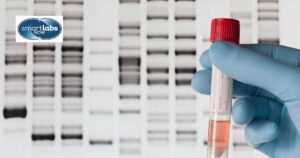
Navigating the process for a court-ordered DNA test can be overwhelming, but understanding the steps and requirements can make the journey smoother.
If you’re facing paternity disputes, child support issues, or custody battles, this guide will walk you through everything you need to know about getting a court-ordered DNA test in Portland, Oregon.
At Smart Labs Now, we offer accurate, affordable, and discreet DNA testing services to meet the needs of Portland residents.
BOOK NOW to prioritize your health with our gentle and professional testing services.

Court-ordered DNA tests are commonly requested in legal situations to confirm or establish biological relationships.
This 2023 article published by Jerold Jackson discusses the potential legal ramifications of discovering biological relatives through ancestry DNA tests, emphasizing the impact on family law cases such as child support obligations and custody disputes.
These are the main scenarios in which such testing may be necessary:
Confirming a child’s biological father is essential in many legal matters. A court-admissible paternity test provides crucial evidence.
Paternity must be established to enforce child support orders. DNA testing is often required by the court.
Proving biological relationships may be necessary in custody and visitation cases.
DNA testing can help clarify eligibility for inheritance, especially in contested estates.
DNA testing reveals hereditary health conditions, offering vital information for both parents and children.
Allegations made during divorce or custody cases may require DNA testing to resolve issues regarding biological relationships.
Non-invasive prenatal paternity tests can determine biological relationships before birth.
Ultimately, the court orders DNA testing if it deems establishing a biological relationship necessary for resolving legal disputes.

The legal process is essential for obtaining a court-ordered DNA test.
This 2024 guide published by Cynthia Hernandez Law outlines the essential steps to obtain a court-ordered DNA test, including filing a petition, court hearings, and selecting an accredited testing facility.
You begin by submitting a formal petition to the family court, requesting a paternity test.
For child support-related cases, the Office of the Attorney General or child support division may assist in initiating the process.
The judge reviews your petition and schedules a hearing to determine if DNA testing is necessary.
If the judge finds sufficient grounds, they will issue an order for the paternity test.
The court mandates testing at an AABB-accredited lab, ensuring the results are accurate and legally valid.
To maintain court-admissible results, the DNA samples must follow a strict legal chain of custody.
In some cases, state social workers or child support enforcement offices may help coordinate testing.
Note: Home DNA test kits are not suitable for legal cases due to the lack of necessary accuracy and legal standards.
Understanding the financial aspects of a court-ordered DNA test is crucial. Costs vary based on factors like state funding, private testing, court fees, and expedited services.
Note: (*) Indicates that the prices may be subject to change and to always call and check the current prices.
In cases involving child support agencies, the state may cover costs for qualifying individuals.
Typically range from $300* to $500*, with additional fees for testing multiple parties.
Standard results take 5 to 7 days; expedited tests (24-48 hours) cost an additional $100 to $200.
Cost $100 to $200 but aren’t court-admissible due to lack of supervised sample collection.
Follow strict chain-of-custody requirements and are conducted in accredited labs.
A confirmed paternity result may lead to child support, custody modifications, or inheritance rights. Courts may require the losing party to reimburse DNA testing costs in disputed cases.
Legal tests require certified professionals to collect DNA and ensure chain-of-custody compliance. Mobile DNA collection services are available but may have additional fees.
While DNA testing can be costly, it is essential for legal clarity. Exploring state assistance programs, accredited labs, and financial implications beforehand is recommended.

A 2018 article published by LAWS.com examines the legal implications of refusing a court-ordered DNA test, highlighting potential adverse judgments and the impact on legal proceedings.
Refusing to comply with a court-ordered DNA test can lead to serious legal consequences:

This 2022 resource published by Wright Hassall explores how DNA testing can resolve disputes in inheritance cases, including the legal considerations and potential outcomes.
DNA test results can have significant implications in family law matters, especially related to inheritance:
DNA evidence can confirm eligibility for contested estates.
Establishing paternity through DNA results determines financial responsibilities.
Biological relationships play a pivotal role in custody decisions.
DNA testing is crucial in resolving legal disputes over paternity.
DNA results offer critical insights into family relationships, health, and legal rights.

This 2023 article published by Boston Bar Journal discusses a Massachusetts Supreme Judicial Court decision that expanded access to DNA testing, providing insights into legal options and advice for individuals seeking DNA analysis.
Seeking legal advice is essential when navigating court-ordered DNA testing:
Experts in family law can guide you through the process, ensuring that you comply with legal standards.
Legal counsel ensures that paternity is properly established, which impacts child support obligations.
State social workers may assist in facilitating testing and resolving disputes.
A legal expert can help ensure that the DNA testing meets court standards for admissibility.
While hiring a lawyer can simplify the legal process, individuals can still request a court-ordered DNA test without legal representation.
Understanding the proper steps and available resources is key to navigating the system effectively.
In child support cases, the state’s child support division may assist in requesting a DNA test.
Some legal professionals offer limited-scope representation to help with document preparation or filing.
Free or low-cost legal aid organizations provide guidance on petition submission and court procedures.
If the mother’s consent is obtained, parties may voluntarily acknowledge paternity and avoid court intervention.
Even without legal representation, individuals can successfully navigate the legal process by leveraging court resources, state assistance programs, and legal aid services.

This 2022 article published by Bronzi Law examines how DNA testing is utilized in New Jersey to establish paternity and resolve inheritance disputes, outlining the legal procedures involved.
Establishing paternity follows a clear legal path:
In some cases, a voluntary agreement can establish legal parentage.
DNA testing provides irrefutable evidence of biological relationships.
Initiated in family law proceedings, ensuring the process is legally binding.
DNA results play a key role in decisions regarding custody arrangements and inheritance claims.

For DNA test results to be admissible in court, testing must meet specific standards:

This chapter published in the Oxford Academic in 2021 provides an overview of the legal rules governing the admissibility of forensic DNA typing results in U.S. court cases, including evidentiary and constitutional considerations.
To be used in legal cases, DNA tests must meet the highest standards:
Only AABB-accredited labs provide legally admissible DNA test results.
The results must clearly establish biological relationships for legal use.
These tests are performed in compliance with court standards, ensuring they hold up under legal scrutiny.

Reliable DNA testing services are essential for legal proceedings:
Non-invasive kits are available for sample collection.
Trusted providers, such as LabCorp, specialize in court-admissible DNA testing.
Ensures secure transportation of samples to testing labs.
Answers to some of the most frequently asked questions regarding court-ordered DNA tests are provided below::
Ans: AABB accreditation ensures that DNA testing laboratories meet the highest standards for quality, accuracy, and reliability. Laboratories accredited by the Association for the Advancement of Blood & Biotherapies (AABB) follow stringent protocols to guarantee that their results are admissible in court and can be used in legal proceedings such as paternity cases, custody disputes, or inheritance matters.
Ans: Legal DNA tests must be performed at accredited facilities that comply with chain-of-custody procedures. You can find approved DNA collection centers in Portland or nearby areas. Many well-known labs, such as LabCorp, offer legal DNA testing services, where professionals ensure that all sample collection and processing follow proper legal protocols.
Ans: Once a court-admissible DNA test establishes paternity, the court may order updates to the child’s birth certificate, which could include adding or removing a parent’s name based on the test results.
Ans: Yes, DNA test results can play a significant role in custody disputes. The court often requires DNA testing to establish biological relationships, which can influence custody and visitation decisions. Legal DNA tests provide undeniable evidence that may strengthen or weaken a parent’s claim for custody or visitation rights.
Ans: Yes, accredited labs handle DNA test results with the utmost confidentiality, ensuring that all genetic information remains secure and private. In legal cases, the lab typically shares results only with the involved parties and the court, unless authorized otherwise.
Ans: Court-approved DNA tests must undergo strict supervision to maintain chain-of-custody requirements, which home DNA tests do not meet. Only accredited laboratories perform court-admissible tests, providing legally valid results that can be used in official matters such as custody disputes or inheritance claims.
Ans: Immigration authorities often require DNA testing to prove familial relationships between applicants and petitioners. These tests must be conducted at accredited facilities that follow proper chain-of-custody procedures, ensuring the results are valid for immigration processes.
Ans: Yes, DNA testing is often crucial in establishing inheritance rights, especially in contested estate cases. DNA tests confirm biological relationships and establish eligibility for inheritance claims, ensuring assets are distributed according to legal guidelines.
Ans: To ensure the legality of your DNA test results, make sure you use an AABB-accredited laboratory and that all sample collection, processing, and handling follow the court-approved chain of custody. It’s essential that the testing process be documented and supervised to meet the legal requirements for admissibility in court.
Ans: A non-invasive prenatal paternity test determines paternity during pregnancy without any risk to the mother or baby. This test uses a blood sample from the mother and a DNA sample from the alleged father. It can establish biological relationships before birth and is useful in legal matters, such as child support or custody disputes.
Ans: Yes, DNA tests are crucial in resolving disputes about biological parentage.DNA testing provides definitive proof of parentage in cases with uncertainty or allegations about a child’s biological parent. This proof can be used in legal matters such as child support, custody, and visitation rights.
Ans: DNA testing establishes paternity or biological relationships, which may be essential for claiming benefits like survivor benefits or Social Security benefits. Proving biological parentage through DNA tests ensures eligibility for such claims, particularly when the parent-child relationship is in question.
It’s important to understand the key differences between legal and home DNA tests:
Choose Smart Labs Now for Quick, Discreet, Affordable, and Court-Admissible DNA Testing in Portland | Oregon 👋

Smart Labs offers reliable, court-admissible DNA testing with quick turnaround times.
Whether you need testing for legal, personal, or medical reasons, our accredited facilities ensure accuracy, confidentiality, and compliance with legal standards.
BOOK NOW to prioritize your health with our gentle and professional testing services.
DISCLAIMER:
Please consult your primary care physician before engaging with any pharmaceutical, natural substances, or activity regimens mentioned or prescribed in this post. Smart Labs Now is not responsible for health or life outcomes based on the information or recommendations provided. This account does not serve as a substitute for professional medical advice/help.